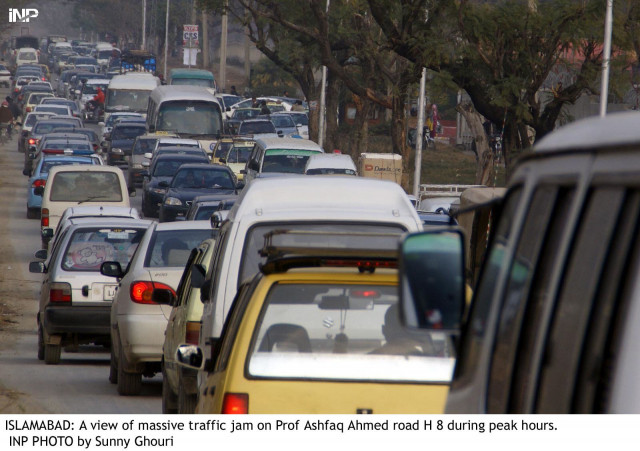Obstacle course: Over 200 city roads blocked for ‘security reasons’, SC told
CDA also informs apex court of over 2,200 cases of non-conforming use

A view of the massive traffic jam on Prof Ashfaq Ahmed road H 8 during peak hours. PHOTO: INP
The Capital Development Authority (CDA) has submitted a 220-page report to the Supreme Court of Pakistan which details residential units in the city which are being used for commercial purposes and as foreign missions, and the roads and streets closed for security reasons.
The CDA has admitted that “no approval of any kind has been sought from the CDA before some 216 roads, streets and footpaths in Islamabad were closed for the general public under the guise of security”. The apex court was also informed that the civic body has taken up the embassy issue with the Ministry of Foreign Affairs.
Blockage of roads, streets
In the report, the CDA informed that the 216 roadblocks include fences, concrete blocks and security walls. The blockades have been placed by the police, ISI, IB, FIA, Rangers and administrations of embassies, ministries, government and private departments, individuals, and residents.
“No approval of any kind has been sought from the CDA for these blockades,” the CDA admitted in its report.

The details show that some 85 roads have been blocked in the G-series of sectors, 81 in the F-series, 43 in the I-series sectors, and seven in Blue Area.
There are 34 major, link or services roads which are blocked, besides 158 streets.
The CDA said it served notices for removal of blockades in only 59 cases, most of which were private individuals.
Constitution Avenue seems the worst affected, as it is blocked at five different locations — near Kohsar Complex, Secretariat Chowk, Cabinet Gate, D-Chowk and Radio Pakistan Chowk.
Meanwhile, Diplomatic Enclave in Sector G-5, according to the report, houses 43 embassies and high commissions, and is totally closed for the general public.
Similarly, Attaturk Avenue, Margalla Road, 3rd and 4th Avenues, and School Road have also been blocked at different points. The embassies of Norway, Denmark, Kuwait, Sudan, Hungary, Korea, Sweden, Switzerland, Australia, Greece, Czech Republic, Philippines, Libya, Portugal, Turkmenistan, and Oman have blocked roads, streets and footpaths in different areas.
The court was informed that Diplomatic Enclave is a designated area for the establishment of foreign missions. Report says that only 36 countries have completed construction of their embassies in the enclave, while seven embassy buildings are under construction and 21 plots are still vacant.

Non-conforming use of residential units
During the previous hearing on December 17, the apex court had directed the CDA to hold a fresh survey to remove discrepancies in its earlier report on the issue.
The new report has counted 2,262 cases of non-conforming use of residential units.
The court was informed that authority had recently removed non-conforming use from some 567 properties, while 1,015 cases are under trial at the DC’s office, 149 cases are in different courts, while 1,695 residential units are still under non-conforming use.
The report says that the operation of foreign missions in residential areas, which fall under non-conforming use, has been taken up with the Foreign Ministry.
Court proceedings
Earlier, a two-judge bench headed by Justice Jawwad S. Khawaja gave serious observations over the CDA report while hearing a case filed by the consultant firm Bridge Factor.
The firm had moved the apex court against the Islamabad High Court judgment, where the IHC had rejected the firm’s plea against a notice served on it by the CDA over non-conforming use.
Justice Khawaja observed that the closure of roads and non-conforming use are serious matters, and requires then attention of the CDA. “The government department should ensure self-accountability to perform better. We [SC] do not formulate laws, but it is our responsibility to ensure implementation of prevailing laws,” Khawaja said.
Justice Sarmad Jalal Usmani, the other member of the bench, observed that a 20-foot wide road was reduced to six-foot by blockades in the name of security.
Later, the court adjourned the case till February 3.
Published in The Express Tribune, January 27th, 2015.



















COMMENTS
Comments are moderated and generally will be posted if they are on-topic and not abusive.
For more information, please see our Comments FAQ